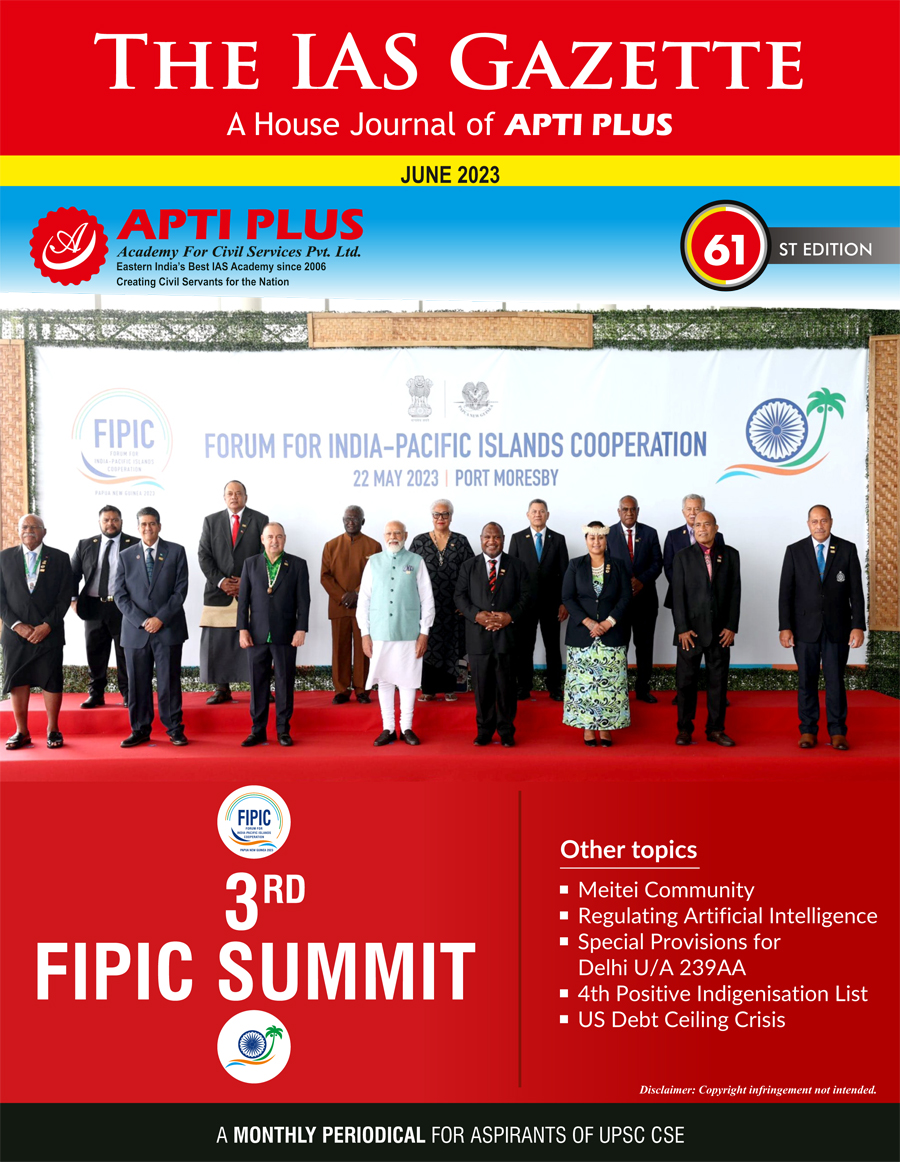Description

Disclaimer: Copyright infringement not intended.
Context
- The Leaders of the Group of Seven (G7), met in Hiroshima for annual Summit more united than ever in our determination to meet the global challenges of this moment and set the course for a better future.
- Invitees were Australia, Brazil, Comoros, Cook Islands, India, Indonesia, South Korea, Ukraine, Vietnam, International Energy Agency, International Monetary Fund, OECD, United Nations, World Bank, World Health Organization and World Trade Organization.
Highlights of the Summit
Ukraine
- G7 is taking concrete steps to support Ukraine for as long as it takes in the face of Russia’s illegal war of aggression.
- The United States, Canada and the United Kingdom issued fresh sanctions on Russia on Friday over its invasion of Ukraine.
Disarmament and Non-proliferation
- They expressed commitment to achieving a world without nuclear weapons with undiminished security for all, through taking a realistic, pragmatic, and responsible approach.
Indo-Pacific
- They reiterated the importance of a free and open Indo-Pacific, which is inclusive, prosperous, secure, based on the rule of law, and that protects shared principles including sovereignty, territorial integrity, peaceful resolution of disputes, and fundamental freedoms and human rights.
Global Economy, Finance and Sustainable Development
- G7 is committed to a stability- and growth-oriented macroeconomic policy mix that supports medium-term fiscal sustainability and price stability.
- They recognize that achieving the sustainable development goals by 2030, reducing poverty, responding to global challenges including the climate crisis, and addressing debt vulnerabilities in low and middle-income countries are urgent, interrelated and mutually reinforcing.
- G7 reiterated the urgency of addressing debt vulnerabilities and fully support the G20’s effort to improve the implementation of the Common Framework for Debt Treatments beyond the Debt Service Suspension Initiative (DSSI) in a predictable, timely, orderly and coordinated manner.
Climate Change
- The G7 listed a set of milestones that need to be achieved for a realistic chance of containing the global rise in temperatures to within 1.5 degree Celsius.
- The G7 stressed on the need for a global peak in emissions by 2025.
- The G7 claimed that their emissions had already “peaked”, and asked all “major economies” to ensure that their individual emissions do not continue to rise beyond 2025.
- The G7 reiterated its commitment to turn net-zero by 2050, and asked all ‘major economies’ to attain net-zero status by that year and to come up with detailed road maps to reach the target.
- The G7 countries put no deadline to ending the use of fossil fuels, only saying that they were committed to accelerating the phase-out of “unabated fossil fuels” in line with 1.5 degree Celsius trajectories.
- They agreed to preserve the planet by accelerating the decarbonization of energy sector and the deployment of renewables, end plastic pollution and protect the oceans.
- They agreed to deepen cooperation through Just Energy Transition Partnerships (JETPs), the Climate Club and new Country Packages for Forest, Nature and Climate.
- They urge Multilateral Development Banks to commit to ambitious adaptation finance targets, announcing revised and enhanced 2025 projections, and call on non-G7 countries to enhance provision and mobilization including private finance for adaptation.
Environment
- They will increase domestic and international environmentally-sound, sustainable and efficient recovery and recycling of critical minerals and raw materials and other applicable materials while increasing circularity along the supply chains.
- They will identify incentives, including subsidies, harmful to biodiversity by 2025, and redirect or eliminate them while scaling up positive incentives for the conservation and sustainable use of biodiversity by 2030 at the latest, taking initial steps without delay.
Energy
- They invited the IEA to make recommendations by the end of this year on options how to diversify the supplies of energy and critical minerals as well as clean energy manufacturing.
- They will enhance efforts to develop the rule-based, transparent global market and supply chains for low carbon and renewable hydrogen based on reliable international standards and certification schemes adhering to environmental and social standards.
- They will work towards ending the construction of new unabated coal fired power generation as one of the primary actions to be taken in line with the IEA net zero by 2050 scenario.
- They commited to maximizing the use of existing reactors safely, securely, and efficiently, including by advancing their safe long-term operation, in addressing the current energy crisis.
- G7 will continue to work with international partners to realize a clean energy economy through concrete actions as laid out in the Clean Energy Economy Action Plan.
Economic Resilience and Economic Security
- They will continue to foster a strong and resilient global economic recovery, maintain financial stability, and promote jobs and sustainable growth.
Trade
- They underscored the importance of working towards WTO reform, including by conducting discussions with the view to having a fully and well-functioning dispute settlement system accessible to all Members by 2024 and by reinforcing deliberation to respond to global trade policy challenges.
Food Security
- They launched the Hiroshima Action Statement for Resilient Global Food Security with partner countries to address needs today and into the future.
Health
- They agreed to invest in global health through vaccine manufacturing capacity worldwide, the Pandemic Fund, the future international agreement for pandemic prevention, preparedness and response, and efforts to achieve universal health coverage (UHC).
Labor
- They emphasized the importance of investment in human capital to ensure a just transition, in response to structural changes such as digital and green transformations as well as demographic changes including societies that are ageing, in part due to declining birth rates.
- They endorsed the Action Plan for Promoting Career Development and Greater Resilience to Structural Changes developed by Labor and Employment Ministers.
Education
- They committed to making progress for ensuring inclusive and equitable quality education, including vocational education, and promote lifelong learning opportunities for all to build resilient, just and prospering societies.
Digital
- As the pace of technological evolution accelerates, G7 affirmed the importance to address common governance challenges and to identify potential gaps and fragmentation in global technology governance.
Science and Technology
- They decided to advance international discussions on inclusive artificial intelligence (AI) governance and interoperability to achieve the common vision and goal of trustworthy AI.
Human Rights, Refugees, Migration, Democracy
- They agreed to cooperate on international migration and strengthen common effort to fight the trafficking and smuggling of human beings and promoting universal human rights, gender equality and human dignity.
- They reiterated to work with international partners to achieve a world that is human-centered, inclusive and resilient, leaving no one behind.
Countering Terrorism, Violent Extremism and Transnational Organized Crime / Upholding the Rule of Law / Anti-Corruption
- G7 reiterated strong commitment to working together with all relevant actors to counter all forms of terrorism and violent extremism, both online and offline, as well as transnational organized crime as well as money laundering and terrorist financing in a unified, coordinated, inclusive, transparent and human-rights-based, gender-responsive manner.
Regional Affairs
- G7 stands prepared to build constructive and stable relations with China, recognizing the importance of engaging candidly with and expressing their concerns directly to China.
- They strongly condemned North Korea’s unprecedented number of unlawful ballistic missile launches, each of which violated multiple UN Security Council Resolutions (UNSCRs).
- They called on the Taliban to uphold its counterterrorism commitments and to ensure the territory of Afghanistan cannot be used to threaten or attack any country, to plan or finance terrorist acts, or to shelter and train terrorists.
- They reiterated their clear determination that Iran must never develop a nuclear weapon.
- They called on Israelis and Palestinians to take steps to build trust toward the realization of a two-state solution.
- They remain firmly committed to an inclusive, UN-facilitated political process consistent with UNSCR 2254 in Syria.
MUST READ ARTICLES:
https://www.iasgyan.in/daily-current-affairs/g-7-50
|
PRACTICE QUESTION
Q) It is necessary to cooperate with China, given its role in the international community and the size of its economy, on global challenges as well as areas of common interest. Discuss. (150 words)
|

https://www.whitehouse.gov/briefing-room/statements-releases/2023/05/20/g7-hiroshima-leaders-communique












